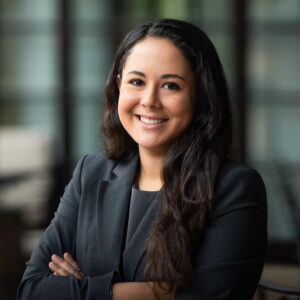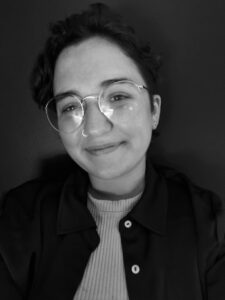We are thrilled to share more about two of our more recent new hires, Eleni Bakst and Michelle Schellinger Gutierrez. Read more about Eleni and Michelle below!

Eleni Bakst
Eleni Bakst is our newest Clinical Instructor at the Harvard Immigration and Refugee Clinical Program. She supervises and trains students in the Harvard Immigration and Refugee Clinic and in the Crimmigration Clinic on appellate and affirmative litigation, as well as direct representation matters. She also serves as the supervising attorney for the HLS Immigration Project (HIP), a student-practice organization focused on immigration-related community engagement efforts and advocacy.
Eleni was previously a Managing Attorney at the Capital Area Immigrants’ Rights (CAIR) Coalition, where she managed the Maryland universal representation team and provided direct representation for detained immigrants at the immigration courts, Board of Immigration Appeals, and federal circuit courts. Prior to this, she was an Assistant Clinical Professor at Seton Hall Law School’s Immigrants’ Rights/International Human Rights Clinic and an Equal Justice Works Fellow at Human Rights First. She holds a J.D. from Duke University School of Law and a B.A. in International Studies from American University.

Michelle Schellinger Gutierrez
Michelle Schellinger Gutierrez is the Harvard Representation Initiative’s new part-time social worker. Michelle will support the holistic needs of individual clients at HRP, providing physical assistance, facilitating connections to community resources, and addressing emotional well-being.
Michelle’s responsibilities extend to collaboration within the Harvard community, working across departments to co-create strategies for supporting students grappling with immigration-related challenges. Bringing a background as an outpatient bilingual trauma-specialized therapist in the greater Boston area, Michelle has experience working with immigrant families, primarily from Central America. In this role, they provided individual, group, and family therapy, and played a key role in initiating a collaboration with various organizations to support recently arrived immigrant high school students in meeting their physical and emotional needs. Michelle’s approach to their work is deeply rooted in narrative and Liberation Health methodologies. They are committed to addressing the impact of systemic barriers on individuals’ well-being through an anti-oppressive and liberative lens.